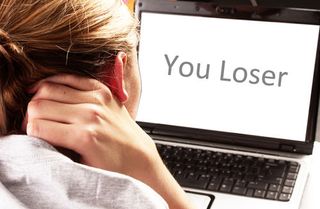How Parents and Schools Can Stop Cyberbullying

"Sticks and stones can break my bones, but names will never hurt me," is an old saying that makes little sense in the new age of cyberbullying.
With the increase of cellphone usage by pre-teens and constant social networking by everyone with pimples, the big, bad bully who used to wait for the skinny, pale kid on the playground no longer needs to be so big — now that he has more technology with which to spread his terror.
What's a school, a parent or a nice kid to do to avoid the digital boogeyman?
Dauntingly enough, cyberbullying occurs "pretty much wherever kids are hanging out online," said Justin Patchin, co-director of the Cyberbullying Research Center and associate professor of criminal justice at the University of Wisconsin-Eau Claire.
Folded notes, dirty looks and threats of beatings have given way to Facebook taunts, cruel text messages, embarrassing YouTube clips and nasty comments in online forums.
"If there is a technology, some kids will think of a way to use it to cause harm to their peers," Patchin said.
Less blatant but just as painful, say experts, is the purposeful broadcasting of social events where a victim is not included.
Stay in the know with Laptop Mag
Get our in-depth reviews, helpful tips, great deals, and the biggest news stories delivered to your inbox.
"Online exclusion goes right to the heart of relationship bullying or relational aggression, and online exclusion creates intense loneliness and confusion for some," says Joel Haber, a New York-based speaker, clinical psychologist and founder of the website RespectU.com.
Keeping tabs
One positive thing about cyberbullying is that it's easier to track than traditional bullying methods. If a child is being e-bullied, parents will be able to — and should — keep records of the incidents, such as by printing out offending statements or documenting episodes.
Parents and kids should also speak with someone at the schools involved and alert them to the issue. Experts advise victims to never respond to taunts or retaliate.
The gray area, as far as school responsibility for cyberbullying is concerned, involves the mobility of applications and usage, and what parameters really include "on school grounds," experts say.
"In the days of mobile communications, it is really hard to differentiate the school campus," said Jeff Godlis, spokesman for i-SAFE, a Carlsbad, Calif., provider of bullying awareness programs for schools,
Godlis cited bus transportation as an example of an ill-defined area.
"It's not just the school grounds anymore," he said. "It's not just pushing someone off the swing."
Another big issue to contend with is the pivotal role of bystanders, Godlis said — with cyberbullying on the Internet, there are "possibly millions of bystanders."
These bystanders, or "upstanders," as i-SAFE calls them, can help mitigate abuse by calling out bullies.
Non-tolerance of bullying is becoming a common motto in schools across the country. South Side Middle School in Rockville Centre, N.Y., for instance, last spring took the entire school to view, and then discuss, "Bully," a graphic documentary film about five students' experiences.
Making schools more responsible
Nevertheless, there are likely to be continued issues surrounding bullies that academia will have to deal with.
In June, according to the New York Post, a New York City judge ruled that a 12-year-old learning-disabled girl who had been the victim of intense bullying at a public school in Manhattan was entitled to enroll in a private school at $40,000 per year on the taxpayer's dime. (The girl now attends public school in another district.)
"When a school fails to take reasonable steps to prevent such objectionable harassment of a student, it has denied her an educational benefit protected by statute," Judge Jack Weinstein wrote in his ruling, which is not final.
Such a precedent-setting ruling, if upheld, could change the way schools deal with bullying and e-bullying. (The private school would not comment on the matter.)
Parry Aftab, an attorney and an expert on cyberbullying, believes Weinstein's ruling will be overturned.
"The judge used a standard that no school could satisfy," Aftab said.
For their part, all school officials should be aware of their actions and the impact they have on both bullies and victims, say experts.
"The coach or teacher who encourages his favored students to 'discipline' an outcast is in effect creating a bullying situation that encourages ganging up on someone," said Hank Nuwer, an expert on hazing and an associate professor of journalism at Franklin College in Franklin, Ind.
No matter how high-tech the bullying gets, age-old rules for civility still apply and schools and parents should remind kids of the basics, Patchin said.
"The bottom line is treating people with respect, online or off," he said.
